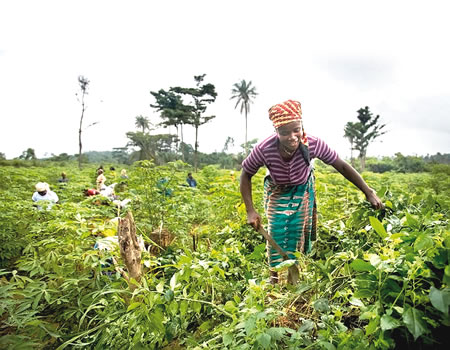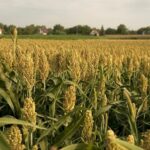After decades of neglect, agriculture in Nigeria is having a moment.
Along with increased budgetary allocations and rapid industrialisation, non-agro firms are now diversifying into farming solutions. Today, agriculture is reported to contribute around 25% of the national GDP.
At the heart of this transformation are rural farmers, who account for 90% of the country’s food. These smallholders cultivate sundry crops—as well as rear livestock—on less than five hectares of land.
Despite their pivotal role, around 72% of these farmers live in poverty, worsened by climate change and little access to financing or technology.
This gap between potential and reality has long stifled growth in a country blessed with vast arable land.
To help bridge this gap, a new agricultural input hub in Ogun State, Fountain Agro Farms and Consult, a subsidiary of Fountaindrip Nigeria Limited, wants to bring farmers in the state closer to new technologies and supplies.
Dubbed as the largest in the state, the facility is a conduit for farmers to access fertilisers, irrigation systems, seeds, and climate-smart technologies, which have long been out of the reach of smallholders.
By slashing transport fees, improving the availability of premium inputs, and offering farmers reliable access to equipment, the hub aims to boost productivity in the state’s farming communities.
The facility offers more benefits, including creating jobs in logistics, retail, and extension services that would stimulate local economies and make farming more lucrative for smallholders.
The development builds on past innovations such as the introduction of modern staking nets, drip irrigation, and soilless farming systems.
No better time
Following global shifts in energy transition, Nigeria has seen declining revenues on its crude exports, once a mainstay of its economy.
Agriculture offers a lucrative alternative, employing more than 36% of the country’s workforce.
Investments like these demonstrate how the sector can absorb labour, generate wealth, and strengthen food security. More importantly, they provide practical solutions to the escalating climate challenges.
As harsh weather patterns—erratic rainfall, prolonged dry spells, and flooding—continue to disrupt traditional farming cycles, access to climate-smart technologies becomes critical.
Tools such as precision irrigation and AI-enabled controllers can spell the difference between profit and loss for farmers.
These innovations allow them to grow more with less water, reduce wastage, and adapt quickly to weather shocks.
A knock-on effect
By strengthening the agricultural value chain, such initiatives can stimulate rural economies, draw the young to farming.
With Nigeria spending billions annually on food imports, empowering local farmers to become self-sufficient can cramp reliance on imported foods.
Still, more investment is needed. The success of one hub or one set of innovations cannot transform the sector alone.
Scaling up such solutions across multiple states, providing access to affordable credit, and integrating digital platforms for farmers will be key.
If Nigeria is to reduce poverty, strengthen its currency, and achieve food security, investments in agriculture must move from isolated interventions to country-wide solutions.
The growing interest from both agro and non-agro firms suggests that this shift is already underway. What remains is ensuring that rural farmers, the true custodians of Nigeria’s food system, are at the centre of this transformation.
Agriculture in Nigeria is experiencing a resurgence with increased investments, contributing to around 25% of the national GDP. Despite their crucial role, 90% of rural farmers, who produce most of the country's food, live in poverty due to challenges like climate change and limited access to finance and technology. To address these issues, initiatives like the agricultural input hub in Ogun State are providing farmers with access to fertilizers, irrigation systems, and climate-smart technologies. These efforts aim to enhance productivity, create jobs, and make agriculture more profitable, especially as global energy transitions reduce revenue from oil exports.
Agriculture employs more than 36% of Nigeria's workforce and presents a viable alternative to shrinking oil revenues. Investments in agriculture can absorb labor, create wealth, and improve food security, offering solutions to climate challenges with innovations like precision irrigation and AI controllers. Strengthening the agricultural value chain can boost local economies and reduce dependence on food imports. However, more extensive investment and scaling of agricultural solutions are needed to ensure significant impact. Empowering smallholders and integrating digital platforms will be crucial in transforming Nigeria's agricultural sector and achieving national food security.






